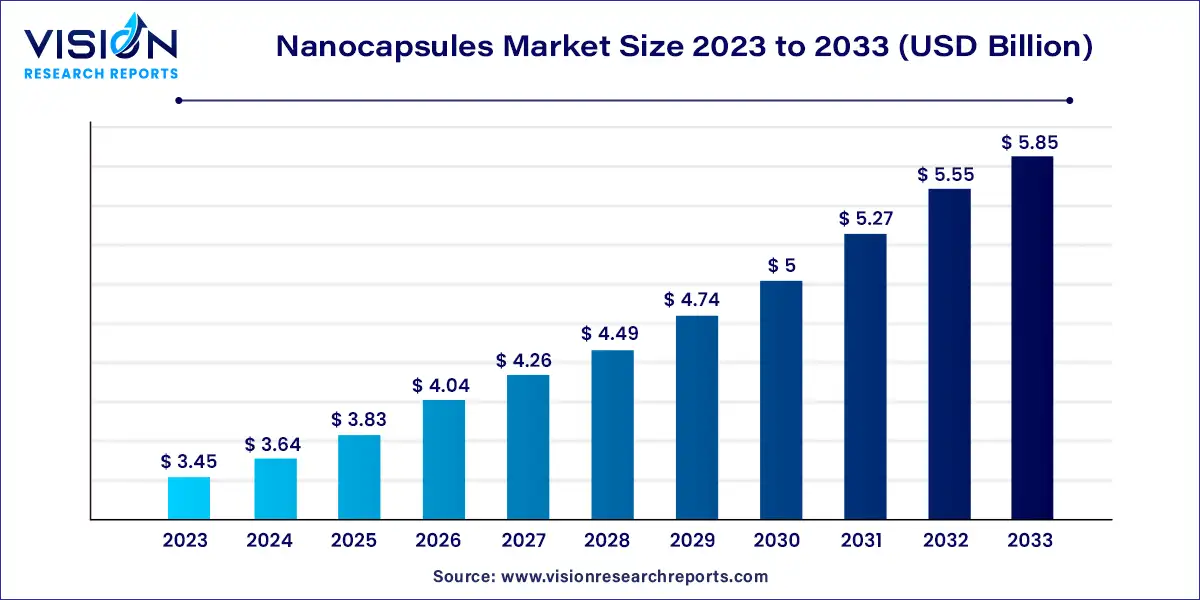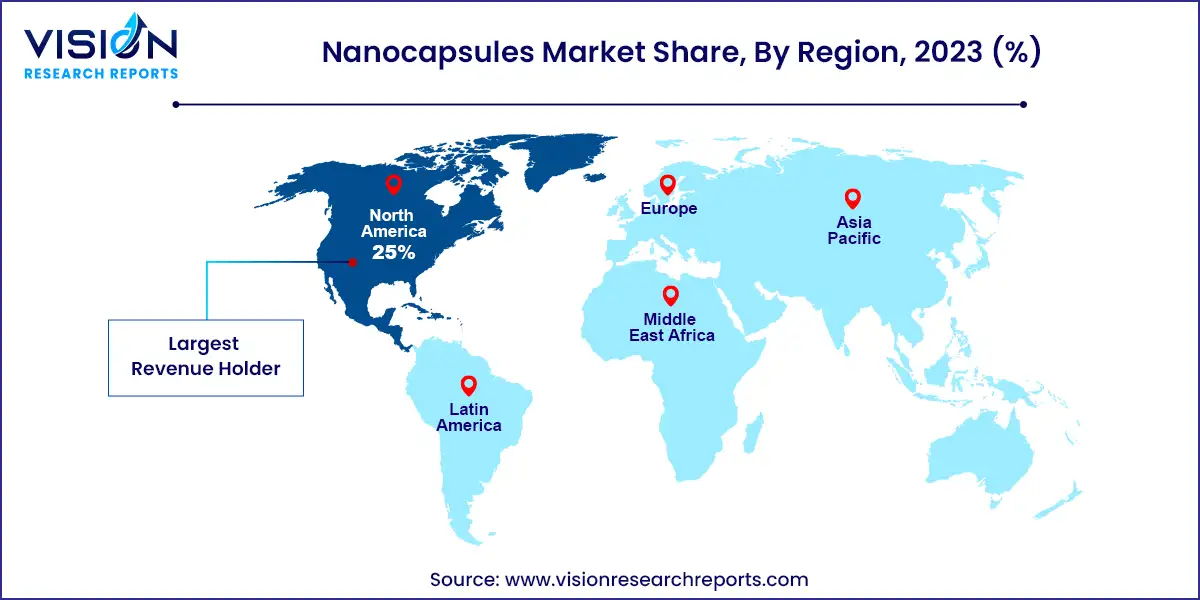The global nanocapsules market size was estimated at USD 3.45 billion in 2023 and it is expected to surpass around USD 5.85 billion by 2033, poised to grow at a CAGR of 5.43% from 2024 to 2033. The nanocapsules market is poised at the cutting edge of pharmaceutical and biomedical innovation, presenting transformative potential across various industries. As the world advances towards more precise and effective therapeutic solutions, nanocapsules—tiny, often less than 100 nanometers in size—are increasingly recognized for their remarkable capabilities in drug delivery, diagnostics, and other applications.

The nanocapsules market is expanding rapidly due to several pivotal growth factors. One of the primary drivers is the increasing demand for advanced drug delivery systems that enhance therapeutic efficacy and reduce side effects. Nanocapsules' ability to deliver drugs directly to targeted areas within the body significantly improves treatment outcomes and patient safety. Additionally, technological advancements in nanotechnology are leading to the development of more sophisticated and efficient nanocapsule formulations. The rising emphasis on personalized medicine, which tailors treatments to individual patient profiles, further fuels market growth, as nanocapsules offer precise and controlled delivery mechanisms. Furthermore, substantial investments in research and development across the pharmaceutical and biotechnology sectors are accelerating innovations and expanding the applications of nanocapsules in drug delivery, diagnostics, and beyond. These factors collectively contribute to the robust expansion of the nanocapsules market.
In 2023, North America led the market with a 25% revenue share, driven by a high incidence of chronic diseases and increased R&D investments. Approximately 45.1% of Canadians had at least one major chronic disease in 2021, prompting significant government initiatives and research into nanocapsule applications.
| Attribute | North America |
| Market Value | USD 0.86 Billion |
| Growth Rate | 5.45% CAGR |
| Projected Value | USD 1.46 Billion |
Europe Nanocapsules Market Trends
Europe is a key market due to increasing investments in nanotechnology research, supported by initiatives like the Phoenix Project funded by the EU’s Horizon 2020 Framework Programme. Rising incidences of chronic diseases are fostering advanced research and development in the region.

Asia Pacific Nanocapsules Market Trends
The Asia Pacific region is expected to see significant growth in the nanocapsules market, driven by advancements in nanotechnology research. China, Japan, South Korea, Singapore, and India are leading in nanocapsule applications. For instance, Japan’s Tokyo Institute of Technology developed a nanoencapsulation strategy for processing insoluble aromatic polymers in water. Research and conferences in China and India are focusing on developing novel therapies, driving market growth in the region.
The healthcare sector dominated the market with a 64% share in 2023 and is projected to grow at the highest CAGR during the forecast period. This growth is driven by advancements in medical technologies, including gene therapy, drug delivery systems, and medical imaging nanobots. Nanocapsules are crucial in gene therapy, serving as delivery vectors to efficiently transfer genetic materials like DNA and RNA into cells. They are engineered to protect and condense nucleic acids, facilitating their delivery into the cytosol and enhancing gene expression. For example, research in 2021 on chitosan-based nanocapsules demonstrated significant potential for treating genetic lung diseases. These nanocapsules encapsulate genetic materials, such as the pCMV-βGal gene, within microspheres for targeted lung delivery.
Additionally, nanocapsules are being explored for delivering anti-inflammatory and anti-cancer drugs, as well as agents for immunotherapy. Their small size and ability to navigate biological barriers make them ideal for these applications. They are also used in MRI-guided nanorobotic systems for therapeutic and diagnostic purposes, where MRI scanners direct magnetic nanocapsules to targeted body areas. This broad range of applications in healthcare contributes to the market's growth.
The food and nutraceuticals segment is anticipated to register a substantial CAGR, driven by applications such as food processing, nanoscale nutraceutical delivery systems, nanoemulsions, and nanocomposite packaging materials. The increased use of nanocapsules in these areas has positively impacted market growth. For instance, a 2023 study published by the National Library of Medicine demonstrated that Ag and TiO2 nanoparticles, combined with hydrogels and aerogels, enhance antibacterial effects and mechanical properties of polymer blends, highlighting their potential in food packaging.
Oncology held the largest market revenue share in 2023. Nanocapsules are emerging as a valuable tool in cancer therapy and diagnostics. These systems, with their core-shell structure, can be engineered to deliver chemotherapeutic or diagnostic agents specifically to tumors, improving treatment efficacy while minimizing side effects. The WHO reported 20 million new cancer cases and 9.7 million deaths globally in 2022. Research is focused on developing novel therapies, such as a 2023 study on metallic iron magneto plasmonic nanocapsules for tumor eradication and a 2022 nanocapsule with Perfluorooctyl Bromide (PFOB) for image-guided cancer treatment.
Nanocapsules are gaining attention for pain management due to their unique properties that enhance the efficacy and safety of analgesic treatments. Various nanoparticles, including polymeric, silica, gold, and magnetic types, are being investigated for pain modulation. Liposomes are commonly used for delivering local anesthetics for skin analgesia and post-surgical pain management. A 2022 study on local anesthetics explored nanocapsules with blended polymeric hydrogels for improved bupivacaine delivery.
By Application
By Therapeutic Area
By Region
 Cross-segment Market Size and Analysis for
Mentioned Segments
Cross-segment Market Size and Analysis for
Mentioned Segments
 Additional Company Profiles (Upto 5 With No Cost)
Additional Company Profiles (Upto 5 With No Cost)
 Additional Countries (Apart From Mentioned Countries)
Additional Countries (Apart From Mentioned Countries)
 Country/Region-specific Report
Country/Region-specific Report
 Go To Market Strategy
Go To Market Strategy
 Region Specific Market Dynamics
Region Specific Market Dynamics Region Level Market Share
Region Level Market Share Import Export Analysis
Import Export Analysis Production Analysis
Production Analysis Others
Others